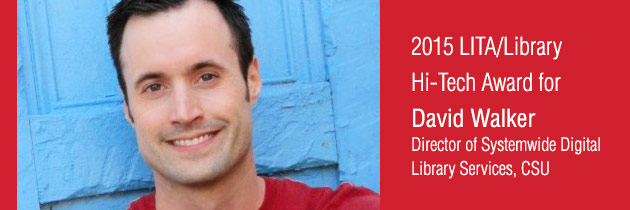From American Library Association
For Immediate Release
Tue, 03/17/2015
Contact:
Mary Taylor
Executive Director, Library and Information Technology Association (LITA)
312-280-4267 or mtaylor@ala.org
CHICAGO — David Walker has been named the winner of the 2015 LITA/Library Hi Tech Award for Outstanding Communication in Library and Information Technology.
Emerald Group Publishing and the Library and Information Technology Association (LITA) sponsor the award that recognizes outstanding individuals or institutions for their long-term contributions in the area of Library and Information Science technology and its application.
Walker is being recognized for his dedication and commitment in developing the open source library portal application Xerxes over the past decade. Originally designed as an improved interface to the Ex Libris Metalib federated search system in 2004, Xerxes now supports a variety of back-end search engines, including commercial library discovery systems, such as Primo, EDS, Summon, non-cost web service (EBSCO Integration Toolkit, Worldcat API) and other search engines (Solr, Google Appliance). Through this effort, Walker has worked with a variety of vendors to develop and test their application programming interfaces and has been recognized by OCLC and Ex Libris for innovative uses of their services. In 2007 Walker released the system under an open source license, and today, Xerxes platform is implemented by over 40 institutions around the globe, with some also contributing code back to the project.
Walker said, “These days, academic libraries are increasingly opting for hosted discovery systems and library services platforms. It’s still vitally important that libraries retain responsibility for the interfaces we present users, and explore new and creative ways to integrate library content and services into learning management systems and other online spaces, which cannot be easily achieved by vendor discovery systems or services platforms. Xerxes continues to provide a flexible and open source platform to explore such projects, regardless of the underlying discovery system or library services platform.”
Currently, Walker serves as director of systemwide digital library services at the California State University (CSU), Office of the Chancellor. In this capacity, he oversees a systemwide discovery system, link resolver and institutional repository service for all 23 CSU campuses. His recent work has focused on moving the CSU libraries from a disparate and disconnected set of local ILS and ERM systems toward a consortium library services platform, as well as exploring integration of library systems and services with learning management systems.
Walker received his MLIS from UCLA. As a librarian, programmer and interface designer, he has led and contributed to a number of open source initiatives in the library community, including developing scripts, plugins, and interface designs for the SFX link resolver, Innovative ILS systems and other library services.
The Library and Information Technology Association and Emerald, the publisher of Library Hi Tech, are pleased to present the 2015 LITA/Library Hi Tech Award to David Walker for his outstanding contributions to communication in library science and technology. The award will be presented during Sunday Afternoon with LITA on June 28, 2015, at the ALA Annual Conference in San Francisco.
About LITA
Established in 1966, LITA is the leading organization reaching out across types of libraries to provide education and services for a broad membership including systems librarians, library administrators, library technologists, library schools, vendors and many others interested in leading edge technology and applications for librarians and information providers. For more information about LITA go to www.lita.org, or contact the LITA office by phone, 800-545-2433, ext. 4268; or e-mail: lita@ala.org
About Emerald
Emerald is a global publisher linking research and practice to the benefit of society. The company manages a portfolio of more than 290 journals and over 2,500 books and book series volumes. It also provides an extensive range of value-added products, resources and services to support its customers’ needs. Emerald is COUNTER 4 compliant. Emerald is also a partner of the Committee on Publication Ethics (COPE) and works with Portico and the LOCKSS initiative for digital archive preservation. It also works in close collaboration with a number of organizations and associations worldwide.
; ?>)
